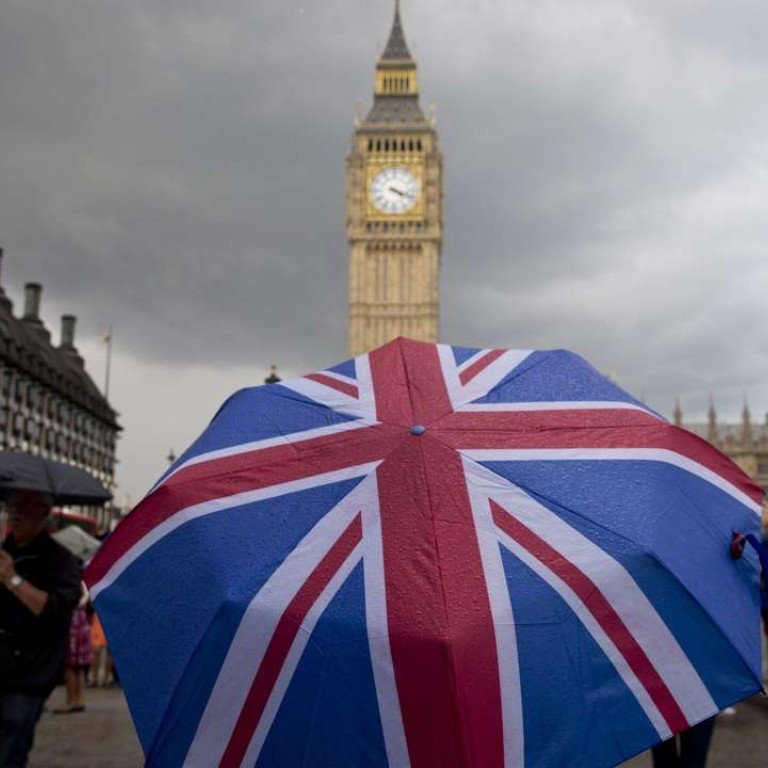
Brexit impact to be felt for years to come, China’s finance minister says
Views split on impact of Brexit on China, while concerns mount in London over future of its role as a global finance hub and gateway to Europe
Finance Minister Lou Jiwei sees Britain’s vote to leave the European Union as heightening uncertainty and impacting markets and the global economy for years to come.
The comments yesterday came as London began to weigh the implications for its reputation as the gateway for US and Asian businesses into Europe’s vast single market.
“[The result] will cast a shadow over the global economy ... The repercussions and fallout will emerge in the next five to 10 years,” Lou said at the first annual meeting of the Asian Infrastructure Investment Bank in Beijing.
“It’s difficult to predict now. The knee-jerk reaction from the market is probably a bit excessive, it needs to calm down and take an objective view.”
Lou’s views were echoed by other economists at the World Economic Forum (WEF) in the northern city of Tianjin.
“It’s hard to talk about and judge the direct impact on China’s economy,” said Huang Yiping, a professor at Peking University and a member of the central bank’s monetary policy committee. “If [Brexit] is an important landmark in terms of a reversal of globalisation, I think that’s very bad for the world, it’s very bad for China.”
But Li Daokui, a professor at Tsinghua University and a former adviser to China’s central bank, was more optimistic.
“China is perhaps one of the least impacted economies in the world by Brexit,” he told an audience at the WEF. “The only short-term impact I can think of is on the exchange rate of the renminbi.”
Meanwhile, in London, there are growing fears that investors and bankers could flee the city after the shock vote, threatening its coveted reputation as a global financial hub.
Some 60 per cent of Londoners voted to stay in the EU in Thursday’s historic referendum, but most of the rest of England cast their ballots overwhelmingly to leave. The capital’s 8.6 million residents, whose GDP is about the same as that of oil-rich Norway, are anxious about the impact on the city’s economy.

According to ratings agency Standard and Poor’s, a fifth of all global banking activity takes place in London.
A haemorrhaging of bankers could hit the city, where the financial sector provides one in three jobs – or about 1.25 million.
British business minister Sajid Javid yesterday urged companies not to panic.
“Our economic fundamentals remain strong. They’re strong enough to weather any short-term market volatility,” he said in an interview with the BBC.
The minister plans to hold a roundtable meeting with business associations this week, with British media reporting that it could be as early as tomorrow.
Javid campaigned for Britain to remain in the EU and warned during the campaign that a vote to leave could trigger a recession and 500,000 job cuts.
On Sunday, he refused to confirm the dire forecasts, saying it was time for “reassurance for businesses”.
“If we all work together we can avoid many of the things we have forecast,” he said. “Let’s look at what opportunities this throws up.”
Scotland’s First Minister Nicola Sturgeon also added to the woes of the Brexit leaders by suggesting the Scottish Parliament could keep Britain from leaving the European Union. She told the BBC yesterday she believed the consent of the Scottish Parliament would be needed for Britain to leave but conceded that the British government would probably take a “very different view”.
European lawmakers have urged Britain to begin EU exit proceedings at a European Council meeting starting tomorrow.
Martin Schulz told German newspaper Bild am Sonntag that a period of limbo would “lead to even more insecurity and thus endanger jobs”.
However, German Chancellor Angela Merkel’s chief of staff insisted there was no rush to show Britain the door.
“The political leadership in London should have the chance to reconsider once again the consequences of a withdrawal,” Peter Altmaier told RND media group.
Altmaier later clarified that he was “explicitly” not suggesting another referendum.
British Foreign Minister Philip Hammond, who had campaigned for Britain to stay, said there would have to be a trade-off with the EU on the free movement of people if Britain wanted to remain in the single market.
Meanwhile, a petition on Parliament’s website for London to be independent from Britain and apply to join the EU – dubbed “Lexit” – has been gaining popularity since it started as a joke on Saturday.
Another petition on the website calling for a second EU referendum has rapidly gathered more than three million signatures.
Ironically, the petition was started in May by a “Leave” campaign supporter as a back-up plan in case the “Remain” camp won.
Reporting by Reuters, Associated Press, Agence France-Presse
